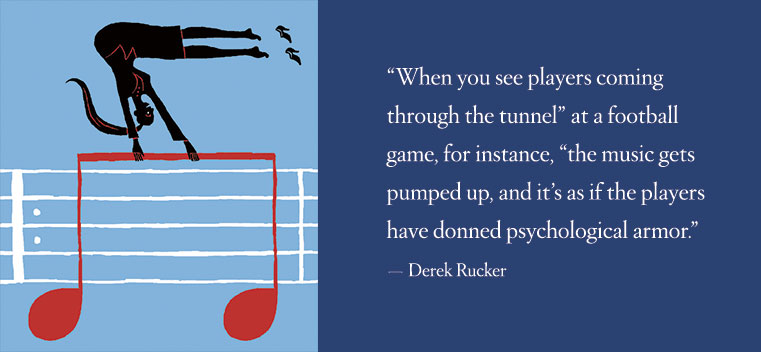
Power Jams
Tell us what you think. E-mail comments or questions to the editors at letters@northwestern.edu.
Ever wonder about those strange designations we use throughout Northwestern to identify alumni of the various schools of the University? See the complete list.
Find Us on Social Media
Bass-heavy playlist can transform the psyche and influence behavior.
If you want to get pumped up for that interview, presentation or first date, put on the proper music, such as some bass-heavy beats, to put you in a more powerful state of mind.
Inspired by the music-infused pregame rituals of high-profile athletes, a team of Kellogg School of Management researchers investigated music’s effect on the psyche.
“We were all interested in the potential transformative effects of music,” says Derek Rucker, professor of marketing, who worked on the study with four colleagues. “We are sports fans, and we observed that when you see players coming through the tunnel” at a football game, for instance, “the music gets pumped up, and it’s as if the players have donned psychological armor.”
The Kellogg team also included Loran Nordgren, an associate professor of management and organizations; former Kellogg professor Adam Galinsky, who is now at Columbia Business School; Dennis Hsu ’13 MS, ’14 PhD, a faculty member at the University of Hong Kong; and Li Huang ’11 PhD, now on the faculty at INSEAD (the European Institute of Business Administration) — all of whom have an interest in power-related research. They wondered if music could get athletes and others in the right frame of mind and if that sense of power could produce power-related behavior, often exhibited in abstract thinking (seeing the forest instead of the trees), illusory control (perceived control over future events) and a propensity to take action or make the first move in a competition.
First the researchers asked participants to rate more than 30 songs from a variety of genres on a seven-point scale for how powerful, dominant and determined the songs made them feel. Queen’s “We Will Rock You,” “In Da Club” by 50 Cent and “Get Ready for This” by 2 Unlimited made up the high-power playlist.
Then, a different set of participants completed one of three tasks while the researchers played the high- or low-power music in the background. In one experiment, participants were asked to complete a word fragment (P_ _ ER) that could be completed as a word related to dominance (POWER) or an unrelated word (PAPER). Participants who listened to empowering music were more likely to complete the fragment using power words than were those who listened to the less empowering tunes.
In another study that explored whether empowering music affected behavior, the participants who listened to the high-power playlist volunteered to go first in a debate almost twice as often as the participants who listened to the low-power playlist. People in power often jump to make the first move, Rucker reports.
“We know that people who possess or lack power behave in a particular way, and we observed those same behavioral patterns in our participants,” he says. “It appears that listening to music for three minutes can be enough to — snap! — transform the psyche. That’s the exciting part.”
Finally, in another pair of experiments the researchers played two-minute instrumental pieces that varied only in levels of bass. The listeners found, both consciously and unconsciously, that music with more bass made them feel more powerful than identical music with less bass.
The next step, Rucker says, is to explore what will happen if a subject is actively engaged in the power tunes strategy. The effect “might be even stronger when I’m trying to do it, when I’m listening to the music and attempting to extract every ounce of power,” he says “But for some people, it may remind them that ‘I need this because I’m not so powerful myself.’ Thus, it’s less clear to us what will happen when people are consciously using this as a strategy.”
Rucker, who counts songs by Queen on his high-power playlist, starts his own course at Kellogg with music before every class — often songs that have been featured in prominent advertisements. “Music has always helped me get into the right mental mode,” he says.
Power, he adds, is only one of many possible effects of music. He and his collaborators hope to explore more broadly how music transforms the psyche in different ways.
“And that gets into the question of what music should I pair with advertisements? What’s the goal? What psychological state of readiness do I want my consumer to be in?” he asks.
“If you think of music as being one way to induce a way of viewing the world, power is one of many different mindsets. … Depending on the type of message, you want music to put consumers in the right frame of mind. So, clearly much remains to be done in this research area.”



 Facebook
Facebook Twitter
Twitter Email
Email


